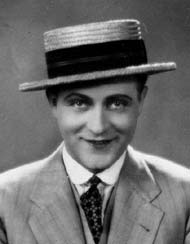Related Research Articles

Willy Fritsch was a German theater and film actor, a popular leading man and character actor from the silent-film era to the early 1960s.

Ágnes Esterházy was a Hungarian film actress who worked mainly in Austria and Germany. She appeared in 32 films between 1918 and 1943.

Ossi Oswalda was a German actress, who mostly appeared in silent films, many of which were early films of German filmmaker Ernst Lubitsch. Her characters were often eccentric, spoiled, and child-like. Oswalda was given the nickname 'The German Mary Pickford' due to her popularity at the time.
I Don't Want to Be a Man is a 1918 German film directed by Ernst Lubitsch.

The Doll is a 1919 German romantic fantasy comedy film directed by Ernst Lubitsch. The film is based on the operetta La poupée by Edmond Audran (1896) and a line of influence back through the Léo Delibes ballet Coppélia (1870) and ultimately to E. T. A. Hoffmann's short story "Der Sandmann" (1816).

Sir or Madam is a 1928 British-German silent comedy film directed by Carl Boese and starring Margot Armand, Percy Marmont and Ossi Oswalda. It was based on the 1923 novel Sir or Madame by Berta Ruck and shot at Elstree Studios near London. The film was a co-production between Germany and Britain, with separate versions released in the countries. In Britain it was not released until February 1930.

My Wife, the Movie Star is a 1919 German silent comedy film directed by Ernst Lubitsch and starring Ossi Oswalda, Paul Biensfeldt and Victor Janson.

The Girl with a Patron is a 1925 German silent comedy film directed by Max Mack and starring Ossi Oswalda, Willy Fritsch, and Nora Gregor. It was shot at the Babelsberg Studios in Berlin. It was one of a number of popular comedies released by UFA during the era alongside its more prestigious art films.

Express Train of Love is a 1925 German silent comedy film directed by Johannes Guter and starring Ossi Oswalda, Willy Fritsch and Lillian Hall-Davis. It premiered on 6 May 1925 at the Ufa-Palast am Zoo in Berlin.

Julia Serda was an Austrian stage and film actress. She was married to the actor Hans Junkermann.
Darling, Count the Cash is a 1926 German silent comedy film directed by Felix Basch and starring Sig Arno, Ossi Oswalda, and Lydia Potechina.

Niniche is a 1925 German silent comedy film directed by Victor Janson and starring Ossi Oswalda, Vivian Gibson and Livio Pavanelli.
Colibri is a 1924 German silent film directed by Victor Janson and starring Ossi Oswalda and Bruno Kastner.
The Stowaway is a 1922 German silent comedy film directed by Victor Janson and starring Ossi Oswalda.

The House Without Men is a 1928 German silent comedy film directed by Rolf Randolf and starring Ossi Oswalda, Iwa Wanja and Ida Renard.
The Swabian Maiden is a 1919 German silent comedy film directed by Georg Jacoby and Ernst Lubitsch and starring Ossi Oswalda, Carl Auen and Hermann Böttcher.

The Ballet Girl is a 1918 German silent comedy film directed by Ernst Lubitsch and starring Ossi Oswalda, Harry Liedtke and Margarete Kupfer.
The Toboggan Cavalier is a 1918 German silent comedy film directed by Ernst Lubitsch and starring Ossi Oswalda, Harry Liedtke and Lubitsch.
The Girl with the Mask is a 1922 German silent comedy film directed by Victor Janson and starring Ossi Oswalda, Paul Biensfeldt, and Hermann Thimig.
Das Milliardensouper is a 1923 German silent comedy film directed by Victor Janson and starring Ossi Oswalda, Georg Alexander and Paul Biensfeldt.
References
- ↑ Bock, Hans-Michael; Bergfelder, Tim, eds. (2009). The Concise Cinegraph: Encyclopaedia of German Cinema. New York, NY: Berghahn Books. p. 353. ISBN 1571816550. JSTOR j.ctt1x76dm6.